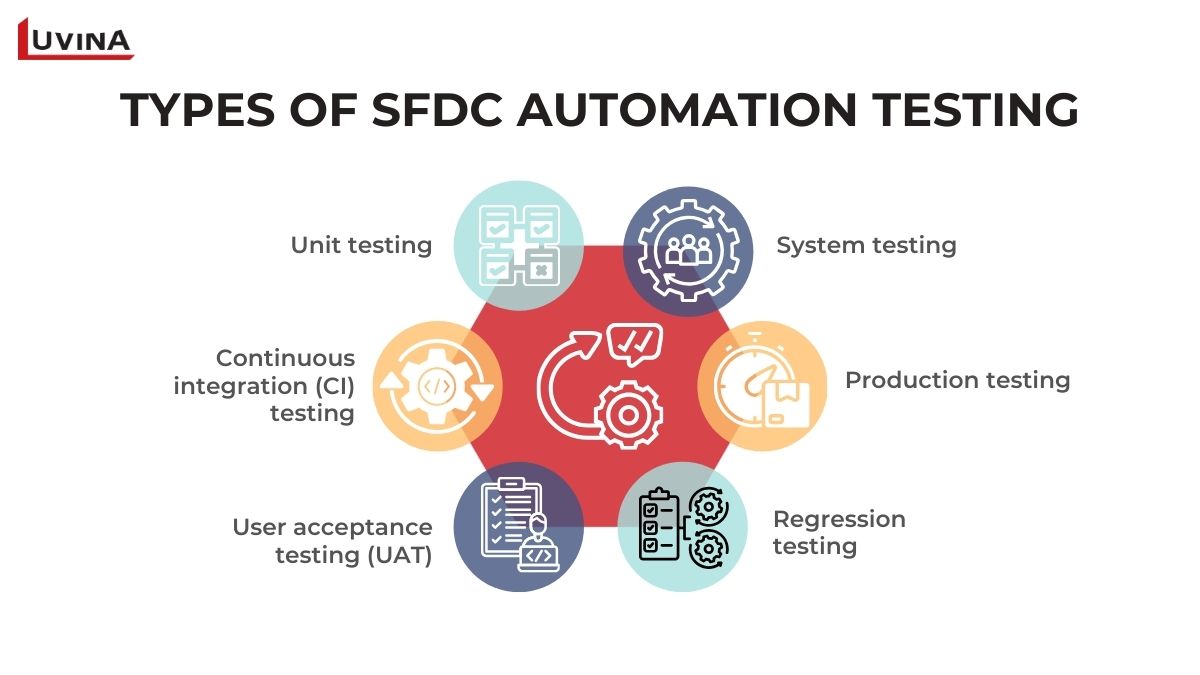Salesforce is known for its high flexibility. However, Salesforce test automation is not a simple issue that businesses using this complex platform have to face. With over 150,000 customers worldwide, Salesforce is becoming one of the most important tools to streamline sales, marketing, and customer service processes in a dynamic business environment. Automated testing for Salesforce is essential to helping this platform adapt to the rapid changes in business.
In the article below, we will explore everything about automation testing in Salesforce, its benefits and challenges, and important Salesforce automation testing tools. Read on to discover more.
What is Salesforce test automation?
Salesforce automation testing is a testing process designed to address the complexity of all the different components that make up the Salesforce platform. This process typically involves writing scripts that run against your code to check if different parts of the application work as expected.

SFDC automation testing processes are often created and executed with the help of Salesforce automation testing tools, which helps identify potential issues before they reach end users and allows businesses to achieve the highest quality. Compared to manual testing, automated testing reduces testing time, providing faster and more reliable releases. However, this does not mean that Salesforce automation testing will completely replace manual testing. Instead, automated testing helps address the challenges faced by manual testing.
What types of test automation are there in Salesforce?
There are many types of Salesforce automation testing, including the following basic types:
- Unit testing: This is an automated testing technique where small parts of the application are isolated and tested to see if they work as intended.
- Continuous integration (CI) testing: Automated tests are run before and after making changes and integrating them into the source code to verify that the new changes and integrations do not cause any issues.
- User acceptance testing (UAT): End-users test the application to determine if it is ready for production. With this testing, you can confirm whether the Salesforce version meets business functionality requirements.
- System testing: Conducted by specific Salesforce experts, this testing relates to the exact usage purposes of the business. This type of testing helps identify issues with the Salesforce automation.
- Production testing: Similar to system testing but performed in the production environment to confirm that code and configurations have been accurately transferred from the testing or sandbox environment to the live application. After completing production testing, UAT should be conducted again.
- Regression testing: This type of testing is usually performed after updates are released and installed or after bugs are found and fixed. It ensures that all previous features and processes still function normally and effectively after changes.

Testing at different levels requires different programming languages and skills, and building an automated testing system is extremely challenging. Therefore, manual testing is initially preferred.
Benefits of automation testing in Salesforce
Implementing Salesforce automation testing brings many benefits, including:
- Expanding test coverage: With automated testing for Salesforce, you can run hundreds of different tests. This helps you cover various scenarios without any obstacles.
- Increasing accuracy: Manual testing can lead to many errors. In contrast, Salesforce automation testing eliminates human factors. This ensures that all test cases and processes are executed continuously and with high accuracy.
- Early issue detection: SFDC automation testing helps you detect issues early in your version, before they become more serious and affect business operations.
- Saving time and costs: Automation testing in Salesforce saves more time and costs compared to manual testing. Automated testing processes help identify issues earlier, preventing them during production. You can use the saved time to perform other valuable tasks. Additionally, automated scripts can be reused in different test cases, saving resources.
- Gaining valuable insights and data: Salesforce automation testing can also generate automatic reports. These reports provide valuable insights into the application components within the Salesforce platform. Based on this information, you can adjust your testing strategy and focus efforts on areas that need attention or where potential issues may arise.
10 Best Salesforce Automation Testing Tools
Currently, there are many Salesforce automation testing tools available for businesses. However, some tools stand out more than others. When searching for suitable Salesforce test automation tools, you should try to choose the ones with the most intuitive and easy-to-use interfaces. These tools will require less coding knowledge and can easily accommodate new updates.

If you’re unsure which Salesforce testing tools to choose, here are our 10 suggestions:
- Provar: With a vast ecosystem, Provar is one of the most popular Salesforce automation testing tools on the market. This tool is specifically designed for Salesforce and has a user-friendly and helpful interface.
- OpKey: OpKey is an SFDC testing tool supported by AI. AI helps predict the tests and upgrades your Salesforce system may need, keeping you ahead of trends and leading the game. Additionally, OpKey offers model-based testing by recording drag-and-drop processes.
- Cigniti: This tool specializes in testing the integration capabilities of CRM with other applications. Its strength lies in helping businesses quickly deploy tests without extensive initial setup.
- ACCELQ: ACCELQ is the best automation tool for Salesforce testing that requires no coding and is AI-supported. This tool is available on Salesforce AppExchange and is currently used by Fortune 500 companies worldwide. It can run continuous tests and automate everything in the Salesforce ecosystem, including cloud solutions, web services, and back-end testing.
- Copado: Copado is a Salesforce automation testing tool with scalability and predictive AI capabilities. This tool can run comprehensive tests while providing businesses with useful data and information to improve Salesforce operations. Copado facilitates business changes, allowing companies to focus on growth.
- Mabl: Mabl aims to make the main testing process accessible to anyone on the IT team. Therefore, this tool features a user interface that records the processes to be tested.
- Eggplant: Eggplant is one of the Salesforce testing automation tools supported by AI, which can help simplify testing. This tool relies on script verification, helping to extend Salesforce testing tools.
- Tricentis: Tricentis is off of the top comprehensive automation testing tools for Salesforce that ensures your CRM will run smoothly with integrated applications whenever updated. Tricentis tests are prioritized to ensure that critical issues are addressed first and unnecessary testing processes are automatically eliminated.
- testRigor: This is the best automation tool for Salesforce testing, based on AI, allowing you to create automated tests in English without needing coding skills.
- Selenium: Selenium is one of the most popular open-source Salesforce automation testing frameworks. However, this tool only supports web-based and code-based testing. This means that each time you need to test a product’s functionality, you must write test scripts in a programming language to perform the tests.
Salesforce Test Automation Challenges
Salesforce is a powerful platform with hundreds of different features, but it is also a complex platform. Therefore, despite the assistance of Salesforce automation testing tools, it can still be a challenging process with many difficulties. Here are some challenges you might face when implementing Salesforce automation testing:
- Customization and custom applications: Salesforce is highly customizable and can be tailored to the needs of the business. However, this strong integration and combination capability make it extremely difficult to test the entire Salesforce environment, especially with complex configurations. Unless you have the right tools, there will always be cases where your Salesforce platform is not fully tested.

- Frequent updates: Salesforce typically updates the platform several times a year. This is both good and bad. Continuous updates improve the platform but can also pose difficulties for automated testing for Salesforce.
- Shadow DOM: Salesforce uses shadow DOM to place objects behind it. Shadow DOM often makes it difficult to locate elements during automated UI testing.
- Heavy DOM structure: The DOM structure of Salesforce is quite heavy and complex. Therefore, accessing elements in the DOM with automation tools requires more time and effort.
- Hidden element identifiers: To identify and locate visual components in the application, UI automation tools often require element details. However, Salesforce uses hidden elements to conceal information from users. This makes automated testing challenging because it is hard to locate these hidden elements using specialized CSS selectors.
- Dynamic elements: Salesforce uses many dynamic elements when running test scripts. These elements are difficult to identify and test.
- iFrames: Each new tab in Salesforce is considered a new frame. The elements inside inline frames, or iFrames, are very difficult to identify and recognize, making SFDC automation testing more challenging.
How can Luvina help?
The power of the Salesforce platform is something that businesses of all sizes need. However, to fully leverage the platform, you also need strong Salesforce automation testing tools along with a skilled testing team.
With over 750 high-tech experts, Luvina can help minimize risks for your business while using Salesforce by developing automated testing processes. Luvina will help you avoid potential issues in the production environment and ensure your platform meets all requirements and expectations.
To conduct Salesforce automation testing, we use advanced Salesforce testing tools such as Copado, Selenium, Eggplant, ACCELQ,… These advanced tools can automate repetitive and time-consuming tasks, delivering faster and better results. Our experts will carefully analyze your needs and create thorough test cases for every scenario.
With Luvina’s end-to-end Salesforce testing services, you can achieve higher productivity at better cost and quality. For consultation on selecting Salesforce automation testing tools and setting up Salesforce automation testing, contact Luvina today.
To learn more about Salesforce solutions, check out these additional resources:









Read More From Us?
Sign up for our newsletter
Read More From Us?
Sign up for our newsletter